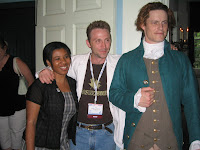 Reception for the 120 delegates here in Philadelphia for the 2007 NEA Representative Assembly, almost 70 Iowa delegates dined together at the historic City Tavern.
Reception for the 120 delegates here in Philadelphia for the 2007 NEA Representative Assembly, almost 70 Iowa delegates dined together at the historic City Tavern.

Now, some of the most influential men in the colonies gathered in Philadelphia to decide a common response to this and other "intolerable acts." For the next decade, City Tavern would be a familiar sight to the leading figures of the American Revolution.


The Tavern was built "for the convenience and credit of the city" by a group of eminent Philadelphians who felt that their hometown deserved a fine tavern which reflected its status as the largest, most cosmopolitan city in British North America. When the Tavern was completed in 1773, it was one of the most elegant buildings in the city. Situated on Second Street, a main thoroughfare, City Tavern was constructed in the latest architectural style and stood three stories high. Inside, it "boasted" of several large club rooms, two of which thrown into one make a spacious room of nearly fifty feet in length, for public entertainment. There were "several commodious lodging rooms, for the accommodation of strangers, two large kitchens, and every other convenience for the purpose." In addition, there was a Bar and also a Coffee Room, which was supplied with British and American newspapers and magazines.


The new Tavern immediately became a social and economic center for the city. The clubrooms hosted various benevolent and social organizations, including the St. George's Society, the Friendly Sons of St. Patrick and the Jockey Club. The elegant Long Room was the setting for gala entertainment and balls. Downstairs, in the Bar and the Coffee Room, important business affairs were conducted by principal merchants of the city.


In 1774, as the breech with great Britain widened, politics were the dominant topic of conversation at City Tavern. In May, leading citizens held a meeting in the Long Room to shape Pennsylvania's response to the "intolerable acts." Three months later, as the delegates to the First Continental Congress began to arrive in Philadelphia, the Tavern was thrust center stage in the dispute with England.


Here the wait staff is dressed in colonial period clothing as they served Team ISEA a delicious meal!
From that time until the close of the century, City Tavern knew the patronage of the great and near-great of the American Revolution. It became the practice of the members of the Second Continental Congress to dine together each Saturday at the Tavern. Eight of the delegates, Randolph, Lee, Washington, Harrison of Virginia, Alsop of New York, Chase of Maryland, and Rodney and Read of Delaware chose to form a "table" and dine there daily. No doubt, matters of momentous importance were discussed and decided over a glass of Madeira and steaming roast of venison.


The war years brought change and turmoil to City Tavern. There was grand entertainment, such as the Continental Congress's first Fourth of July celebration in 1777, but there were also melancholy events, including the funeral of General Hugh Mercer of Virginia. Daniel Smith, the first manager of the Tavern, and host to the Continental Congress showed himself to be a Loyalist when the British Army captured Philadelphia in the Fall of 1777. When his protectors left in June of 1778, "little Smith" as he was known, went with them. Fortunately, a new manager, Gifford Dalley, was found in time to host a gala Independence Day celebration to mark the city's liberation. After the war, the Tavern settled into a more sedate existence that was not interrupted until the opening of the Constitutional Convention in 1787. Once again, these leaders enjoyed the hospitality of the City Tavern. It was fitting that after the adjournment of the convention in September, delegates gathered for one final dinner at the City Tavern.


In the 1790's, City Tavern began to lose its place of prominence to newly constructed "hotels." For the next half century, it underwent a number of changes, serving primarily as a merchant's exchange until 1834. In 1854 it was demolished to make way for new brownstone stores. A newspaper of the time noted the passing of the Tavern, and remarked that in a generation or two, "City Tavern will not be remembered except by some curious delver into the past."


Providing a wonderful program following our dinner was the young Thomas Jefferson. Jefferson addressed our group for nearly 40 minutes before yielding to questions about his life. Team ISEA members and guests felt this was a terrific way to enjoy the company of our fellow delegates and to relive our nation's history!

No comments:
Post a Comment